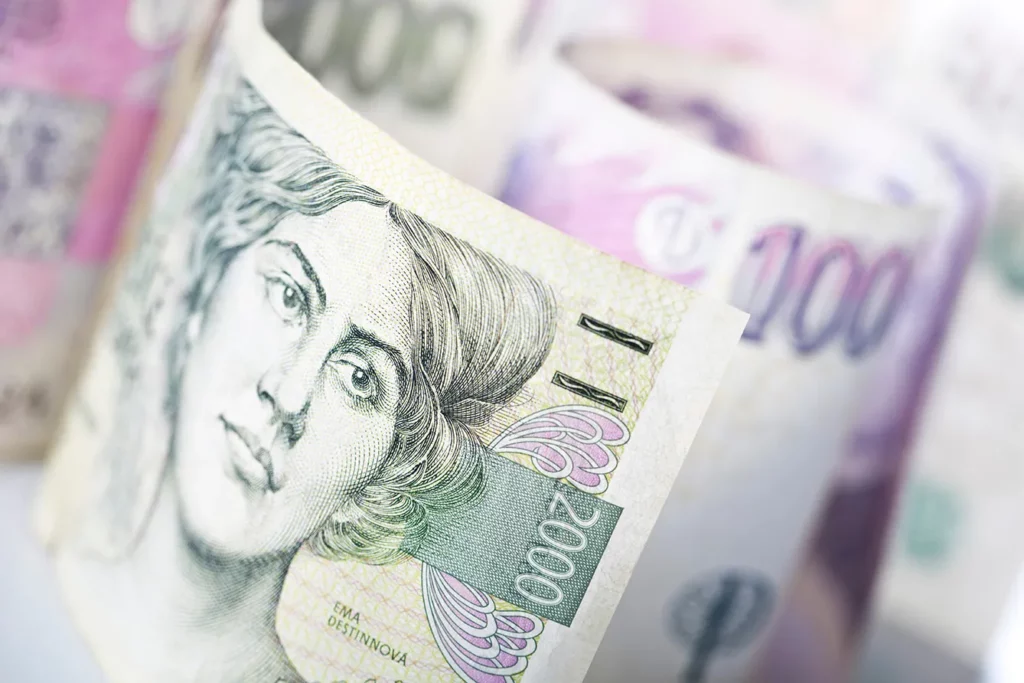Every once in a while, as if with regularity, a public debate on adopting the Euro flares up in the Czech Republic. To accept or not to accept, to keep the Czech crown, or to say goodbye after decades. It is a debate to which almost everyone contributes, but no one knows the correct answer. And so it seems the Czechs will have the debate for the next few years.
The long history of Czech Crowns
The debate on whether the Czech Republic should adopt the Euro as its official currency is one of the most critical and controversial ones in Czech politics and economics. The topic is hotly debated, and opinions are deeply divided. And no wonder. Czechs are very attached to their currency, created in 1919, less than a year after the founding of independent Czechoslovakia. The Czech crown accompanied Czechs through the golden years of the so-called First Republic, the Great Depression, the Second World War, and 40 years of communist dictatorship.
Czech crowns also jingled in people’s pockets in 1989 when they demonstrated against the communist regime and when democracy was born. On 1 January 1993, the Czechoslovak Federative Republic was divided into two independent nations, and on 8 February 1993, the Czechoslovak Crown ceased to exist. The exchange ratio to the successor currencies was 1:1. These became the Czech koruna and the Slovak koruna, which was replaced in Slovakia by the Euro on 1 January 2009.

Crown to Euro
When the Czech Republic officially joined the European Union, it formally committed to adopting the single European currency. But adopting the Euro is not just a matter of being in the EU and wanting to. It involves strict fiscal and monetary rules.
To adopt the Euro as a currency, a country must meet specific criteria and follow a process established by the EU. These criteria and rules are laid out in the Maastricht Treaty, also known as the Treaty on European Union. The key rules and criteria for a country to adopt the Euro include the Price Stability rule, which says that the inflation rate in the country should not exceed the average of the three lowest inflation rates in the EU by more than 1.5%. The Government Debt rule says that the government debt should not exceed 60% of GDP.
In total, there are eight such rules the country has to meet in order to join the common currency system. Some of these criteria have long been met by the Czech Republic, such as the government debt rule, while others have not, such as the inflation rule. But this does not necessarily mean that non-compliance equals a ban on entry. For example, even Greece did not meet most criteria in 2001 and was admitted to the euro area by political decision.
Arguments for the Euro
One of the main arguments for adopting the Euro is to simplify trade. Using the Euro would simplify trade with other Euro-area countries, which can be advantageous for Czech companies, especially if they have essential trading partners in the EU. Euro also brings the advantage of removing the exchange rate risk that Czech firms currently have to consider. Most companies insure against this risk.
Adopting the Euro would also make it easier for Czech companies to apply for loans in euros: loans where the average interest rate is 3% lower than for a loan in Czech currency. That would allow companies to make substantial savings and free up available cash for bigger investments, higher salaries, and expansion.
The Euro would make traveling and shopping abroad easier for common consumers. It would also become an easy comparator of prices of goods and services in the Czech Republic and abroad. The President of the Czech Republic, Petr Pavel, and the Speaker of the Chamber of Deputies, Markéta Pekarová Adamová, are supporters of the Euro. Tomáš Prouza, President of the Confederation of Commerce and Tourism of the Czech Republic, has also supported the common currency long-term.
Arguments against the Euro
The main economic argument against the adoption of the single European currency is that the Euro removes from the hands of national central banks and governments the essential tools for dealing with economic problems such as recession and unemployment.
Monetary policy is thus placed in the hands of the European Central Bank, which creates a monetary policy that, although, on average, suits the entire monetary union, may not be sufficient to solve local problems.
Another risk is the ‘health’ of some euro area economies. These include Portugal, Italy, Ireland, Greece, and Spain—the so-called PIIGS. Alarming is also the fact that the Maastricht criteria are not met even by the so-called “western wing” countries of the EU, which have been using the Euro for a long time. Joining a monetary union that requires newcomers to comply with rules it does not follow is risky at minimum.
The change over to the Euro would also require the expenditure of considerable financial resources. Technical, administrative, and information systems will have to be adapted and changed. Banking sector programs, ATMs, and accounting systems will also have to be replaced.
Businesses will have to revalue goods, train, retrain, and reskill staff, introduce new cash registers, and make many other changes.
Withdrawing the old currency and printing new money will also incur costs. All of that involves new regulations, the issuing of new documents, and campaigns to announce the introduction of the new currency.
Among the champions of preserving the crown are former presidents of the Czech Republic, Václav Klaus and Miloš Zeman. Jan Skopeček, Deputy Speaker of the Chamber of Deputies, a prominent economist and university professor, is also a vocal supporter of the Czech national currency.
What do people think?
The simple answer to what Czechs think about this topic is “Absolutely everything.” It could be said that there are currently about 10.5 million opinions on the Euro in the Czech Republic, which could be summarized in two broad categories. The first is Yes; the second is No.
And which of these answers has a long-term and current suggestion? According to the latest Eurobarometer, the official poll of public opinion in the European Union, from April 2023, 45% of the Czech population favors adopting the Euro. A majority of 55% of Czechs are against adoption.
An even more recent Czech poll conducted by the Centre for Public Opinion Research in July 2023 shows that only 22% of Czechs want the single currency. A respectable 73% of the population favors maintaining the national currency.
But, like most things, adopting the single European currency is primarily a political decision. The Czech Republic committed to adopting the Euro when it joined the EU. Now, it is up to the Czech government to decide. So far, however, the Czech government’s approach has been relatively moderate. Ministers are as divided on the Euro as the majority of the population and have long referred to a simple fact: We do not yet meet the Maastricht criteria.







